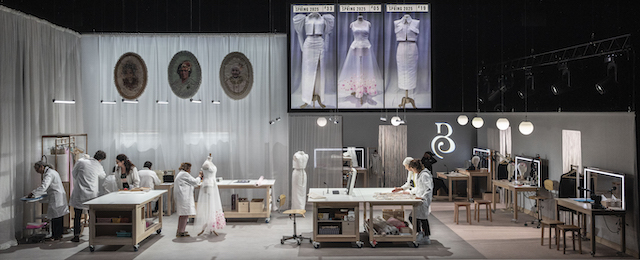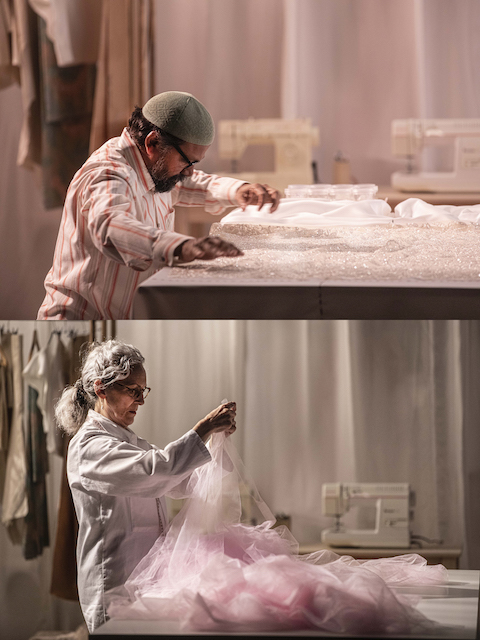Lacrima, Barbican review - riveting, lucid examination of the forces of globalisation through a dress | reviews, news & interviews
Lacrima, Barbican review - riveting, lucid examination of the forces of globalisation through a dress
Lacrima, Barbican review - riveting, lucid examination of the forces of globalisation through a dress
A visually virtuoso work with the feel of a gripping French TV drama
So often the focus – in the coverage of a royal wedding – is the story of the woman wearing the bridal dress. While every fashion choice she makes will be scrutinised for the rest of her life, it is, nonetheless, she herself who will be mercilessly interrogated as the representative both of a nation’s ideals and its discontents.
So it’s a refreshing departure that Caroline Guiela Nguyen’s ravishing, emotionally absorbing Lacrima puts its lens firmly on the dress. It’s a story that’s every bit as human as the princess herself as it reveals a whole ecosystem of workers and the pressures and ambitions that drive their lives.
Lacrima sweeps us from a Parisian fashion workshop to the lacemakers of Alençon (a commune in Normandy) and the male embroiderers of Mumbai. In this avant-garde production a lot of the detail is documentary-worthy: we discover, for instance, that many female lacemakers went blind between the age of 30 and 35, or that it can take an entire day to make one centimetre squared of lace. But what binds the entire production together into a compelling three hours (with no interval) is the story of Marion, the workshop manager at the Beliana haute couture house in Paris. Determined, discreet and clearly married to her job, her joy when she wins the contract to oversee the making of the wedding dress is gradually eclipsed by the pressures of holding not just the other fashion workers but her own family together.
As Marion, Maud Le Grevellec heads up a multi-tasking cast made up both of trained and untrained actors. We first see her on a Zoom call with Natasha Cashman’s sharply intelligent, empathetic doctor, who can appreciate – in a way that we cannot – that Marion is in emotional and physical trouble. Suddenly she collapses and on stage we watch the paramedics rush in and try to resuscitate her. We have no idea whether or not the resuscitation will be successful before the stage is cleared, and the action rewinds to several months earlier, when the design of the dress begins.
 This dramatic framing gives the whole enterprise the feel of a gripping French TV drama (the multilingual play is performed with surtitles). Guiela Nguyen subtly entwines the personal with the political so that we can see how, for instance, aspects of Marion’s emotional problems spring both from her husband’s profound professional jealousy of her and her own workaholic perfectionism. Like so many women, she must present a calm face to the world while reconciling the multitude of tensions imposed on her both by society and her loved ones. Le Grevellec’s performance is remarkable precisely because it is not histrionic, but conveys a real sense of the stoicism Marion feels she must show till the very last minute. Antoine Richard and Thibaut Farineaud's pulsing sound design heightens the sense of her inner turmoil.
This dramatic framing gives the whole enterprise the feel of a gripping French TV drama (the multilingual play is performed with surtitles). Guiela Nguyen subtly entwines the personal with the political so that we can see how, for instance, aspects of Marion’s emotional problems spring both from her husband’s profound professional jealousy of her and her own workaholic perfectionism. Like so many women, she must present a calm face to the world while reconciling the multitude of tensions imposed on her both by society and her loved ones. Le Grevellec’s performance is remarkable precisely because it is not histrionic, but conveys a real sense of the stoicism Marion feels she must show till the very last minute. Antoine Richard and Thibaut Farineaud's pulsing sound design heightens the sense of her inner turmoil.
As a critique of globalisation, this Théâtre National de Strasbourg production is a fantastically clear and intimate piece. While Marion is the simmering pressure cooker at the production’s heart, we also find ourselves moved by the story of Abdul, the Mumbai embroiderer who’s forced into hundreds of hours of overtime, pushing his already weakened eyesight till he’s blind. Thérèse, the 74-year-old lacemaker, is forced to confront the earlier tragedy of her sister’s death when her granddaughter starts suffering from a mystery disease that the doctors believe may be hereditary.
What’s most powerful is that there’s no sense of anger driving this piece (even though its title is the Latin for 'a tear'), more a sense of the complex contracts humans strike to survive. For all the problems connected to their work, for instance, the lacemakers are passionately determined that younger women will keep learning their skill. Guiela Nguyen gives the usual disclaimer that any perceived similarities to living individuals is coincidental. Yet this riveting, lucid three hours should make you think twice about the ambitions and sacrifices of those involved next time you look at something meticulously crafted, whether it’s a wedding dress, a state-of-the-art car, or simply the phone that you consult on a daily basis.
The future of Arts Journalism
You can stop theartsdesk.com closing!
We urgently need financing to survive. Our fundraising drive has thus far raised £49,000 but we need to reach £100,000 or we will be forced to close. Please contribute here: https://gofund.me/c3f6033d
And if you can forward this information to anyone who might assist, we’d be grateful.

Subscribe to theartsdesk.com
Thank you for continuing to read our work on theartsdesk.com. For unlimited access to every article in its entirety, including our archive of more than 15,000 pieces, we're asking for £5 per month or £40 per year. We feel it's a very good deal, and hope you do too.
To take a subscription now simply click here.
And if you're looking for that extra gift for a friend or family member, why not treat them to a theartsdesk.com gift subscription?
more Theatre
 50 First Dates: The Musical, The Other Palace review - romcom turned musical
Date movie about repeating dates inspires date musical
50 First Dates: The Musical, The Other Palace review - romcom turned musical
Date movie about repeating dates inspires date musical
 Bacchae, National Theatre review - cheeky, uneven version of Euripides' tragedy
Indhu Rubasingham's tenure gets off to a bold, comic start
Bacchae, National Theatre review - cheeky, uneven version of Euripides' tragedy
Indhu Rubasingham's tenure gets off to a bold, comic start
 The Harder They Come, Stratford East review - still packs a punch, half a century on
Natey Jones and Madeline Charlemagne lead a perfectly realised adaptation of the seminal movie
The Harder They Come, Stratford East review - still packs a punch, half a century on
Natey Jones and Madeline Charlemagne lead a perfectly realised adaptation of the seminal movie
 The Weir, Harold Pinter Theatre review - evasive fantasy, bleak truth and possible community
Three outstanding performances in Conor McPherson’s atmospheric five-hander
The Weir, Harold Pinter Theatre review - evasive fantasy, bleak truth and possible community
Three outstanding performances in Conor McPherson’s atmospheric five-hander
 Dracula, Lyric Hammersmith review - hit-and-miss recasting of the familiar story as feminist diatribe
Morgan Lloyd Malcolm's version puts Mina Harkness centre-stage
Dracula, Lyric Hammersmith review - hit-and-miss recasting of the familiar story as feminist diatribe
Morgan Lloyd Malcolm's version puts Mina Harkness centre-stage
 The Code, Southwark Playhouse Elephant review - superbly cast, resonant play about the price of fame in Hollywood
Tracie Bennett is outstanding as a ribald, riotous Tallulah Bankhead
The Code, Southwark Playhouse Elephant review - superbly cast, resonant play about the price of fame in Hollywood
Tracie Bennett is outstanding as a ribald, riotous Tallulah Bankhead
 Reunion, Kiln Theatre review - a stormy night in every sense
Beautifully acted, but desperately grim drama
Reunion, Kiln Theatre review - a stormy night in every sense
Beautifully acted, but desperately grim drama
 The Lady from the Sea, Bridge Theatre review - flashes of brilliance
Simon Stone refashions Ibsen in his own high-octane image
The Lady from the Sea, Bridge Theatre review - flashes of brilliance
Simon Stone refashions Ibsen in his own high-octane image
 Romans: A Novel, Almeida Theatre review - a uniquely extraordinary work
Alice Birch’s wildly epic family drama is both mind-blowing and exasperating
Romans: A Novel, Almeida Theatre review - a uniquely extraordinary work
Alice Birch’s wildly epic family drama is both mind-blowing and exasperating
 The Producers, Garrick Theatre review - Ve haf vays of making you laugh
You probably know what's coming, but it's such great fun!
The Producers, Garrick Theatre review - Ve haf vays of making you laugh
You probably know what's coming, but it's such great fun!

Add comment